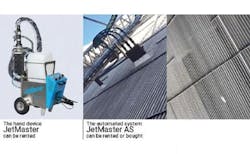JetMaster System
Especially in the spring and summer, finned heat exchangers quickly polluted by pollens, sand, dust and other suspended particles in the environment. These form an insulating layer on the lamellae, which significantly reduces energy efficiency. Nevertheless, to achieve the required cooling capacity, rotors have to turn faster and consume significantly more energy. Cooling capacity dependent production processes can also be affected. The operating times can also be significantly reduced by contamination, as these lead to corrosion of the slats.
The cleaning system JetMaster works gently with compressed air and small amounts of water (0.20-0.75 l / min) and can therefore also be used in a moisture-sensitive environment. The complete JetMaster + system offers four different combination options and can thus be tailored precisely to the cleaning task. Even the hardest calcifications and large amounts of residue can be removed. The gentle beam penetrates deeply into the devices without bending or damaging the fine fins. The contaminants are gently but effectively released from the surfaces using jet stream by effect of cavitation. Possible damage to the lamellar surfaces, with the use of high pressure water cleaning, is eliminated with proper use of the JetMaster. In addition to manually usable devices, there is also the option of automating the cleaning system for larger heat exchanger surfaces of any type.
Main expense for the cleaning service for small heat exchangers is usually the long journey to the customer. The arrival / departure often takes more time than the entire cleaning. In the case of large lamellar surfaces, on the other hand, personnel costs and possible downtimes due to shutdown become significantly more important. Timely rental of the JetMaster system can significantly reduce cleaning costs.
In addition to the incidental arrival and departure customers have the advantage of renting, manual cleaning equipment within Germany already about 3 days to receive order. The lead time is thus greatly reduced. If necessary, they start the cleaning independently and are not bound to additional dates.
A big advantage of automated systems is their constant availability. In addition, if required, it is possible here, to leave the rotors in operation during cleaning or to switch off only the rotors which are currently overrunning the system.
